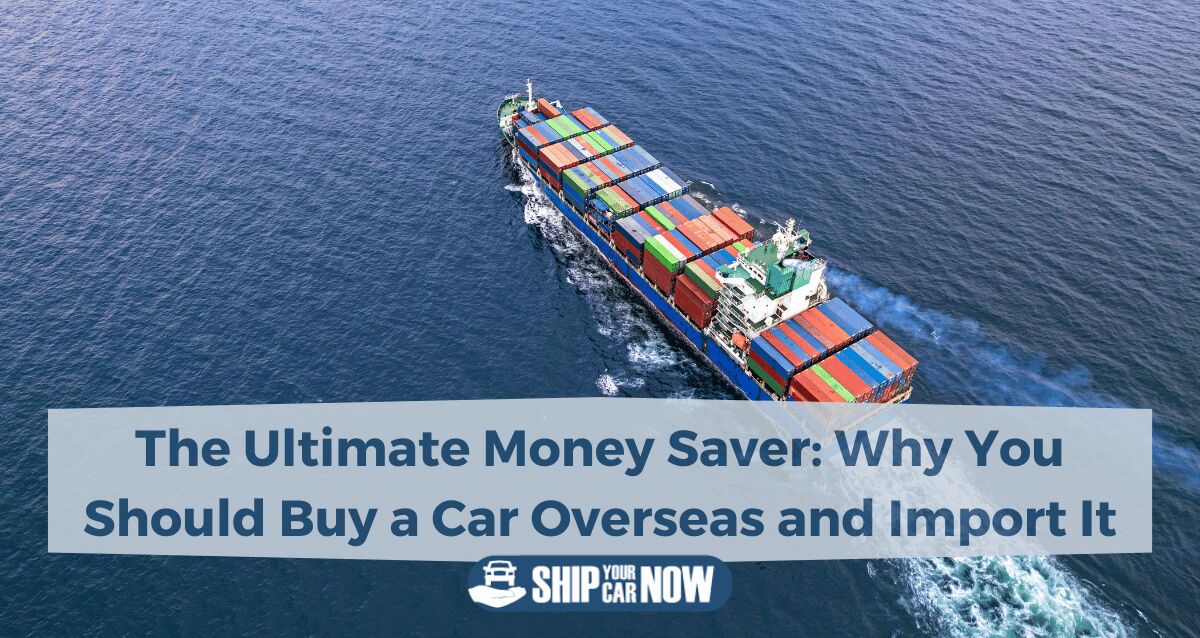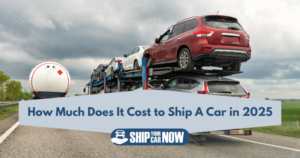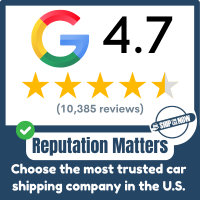Wondering if it’s cheaper to buy a car overseas? After coordinating international shipments for hundreds of customers, ShipYourCarNow can tell you that buying vehicles abroad often leads to significant savings.
Download the International Car Shipping Checklist here.
Key Takeaways
- Buying a car overseas can often provide significant savings even after accounting for shipping, duties, and compliance costs. European luxury vehicles typically cost 15-25% less in their home countries, while Japanese domestic market vehicles can be found at half the US price.
- Container shipping offers maximum protection for valuable vehicles, while Roll-On/Roll-Off (RoRo) provides a more economical option for standard cars.
- Import duties are generally 2.5% for cars but can reach 25% for trucks, plus additional processing fees ranging from $300-500.
- Vehicles must comply with EPA emissions and DOT safety standards, with modifications costing $0-5,000 depending on the vehicle’s original specifications.
Learn more about international vehicle shipping from America’s most trusted car shipping company!
What Are The Benefits of Purchasing Overseas?
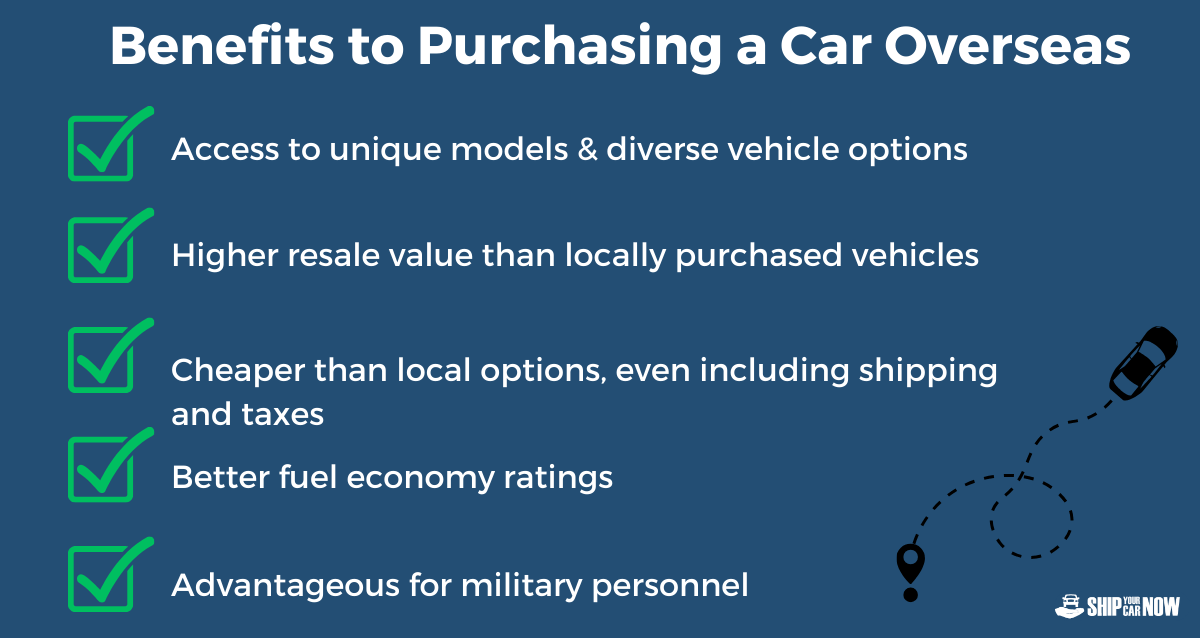

Buying a car overseas can be a thrilling adventure. Whether you’re a military or civilian employee stationed abroad or simply a car enthusiast seeking a unique vehicle, ShipYourCarNow has got you covered!
Here are just a few benefits of purchasing a car overseas:
- Access to Unique Models:
Buying a car overseas opens the door to models not available locally. This is especially attractive for those seeking their dream car, including exotic cars, specific diesel-fueled cars, or light-duty trucks. - Cost Savings:
Importing vehicles is often cheaper compared to local purchases. Even with import taxes and duties, the overall price paid is typically cheaper—learn more about car shipping costs. - Diverse Vehicle Options:
You can choose from a wide range of imported automobiles, including both used vehicles and new vehicles, catering to various needs. Whether it’s passenger cars or nonconforming vehicles, the options are plentiful. - Support for Military and Civilian Employees:
International vehicle shipping allows these individuals to bring personal belongings and enjoy a familiar ride upon returning home—read more about car shipping for service members. - Higher Resale Value Potential:
Certain imported cars maintain a higher resale value, particularly if they are from reputable manufacturers or feature desirable attributes. Looking to sell your car, check out our step-by-step guide for selling your car on Carvana. - Environmental Benefits:
Many imported vehicles offer better combined fuel economy ratings, making them an eco-friendly choice.
Choose the Right Country for Your Purchase

Experience matters—now is the time to be picky! The local vehicle market you choose can make all the difference.

For instance, if you’re dreaming of a Volkswagen Golf or a BMW 3 Series that’s not sold in the U.S., countries like the UK—with their robust auto manufacturing industries—could be your winning ticket.
It’s also important to consider price differences between countries as they can be staggering. In Japan, for instance, you could score used vehicles like the Toyota Supra for a fraction of the price you’d find at European dealerships.
Conversely, luxury cars like Porsche models are often more accessible in Germany, thanks to lower taxes and the fact that these vehicles are manufactured locally.
In a nutshell, the ideal country for your purchase hinges on vehicle availability, price fluctuations, and import regulations so be sure to take all these factors into consideration upon choosing what country to import from (1).
Navigate Import Regulations

Now, import regulations can be a bit tricky, but if you do your research, you’ll breeze through!
Each country has its own rules and taxes that can affect the overall cost of buying a car abroad.

Make sure you understand the legal requirements for bringing a vehicle into the U.S., like emissions and safety standards. Do note, the U.S. has strict regulations that your car must meet to be imported and registered.
For instance, if you’re looking to import a used car from Japan let’s say, it must comply with the Environmental Protection Agency (EPA) emissions standards and the Department of Transportation (DOT) safety requirements.
Remember: the U.S. has strict regulations that your car must meet to be imported and registered.
For instance, if you’re looking to import a used car from Japan let’s say, it must comply with the Environmental Protection Agency (EPA) emissions standards and the Department of Transportation (DOT) safety requirements.
This means your vehicle needs a certification label affixed by the manufacturer, proving it meets the necessary U.S. standards (2). If the car doesn’t meet these requirements, you could face hefty fines or even have your import denied.
Read more about the Motor Vehicle Safety Act of 1966, which regulates the safety standards for imported motor vehicles. A nonconforming vehicle can be imported into the U.S. if they are modified, tested, and certified by an Independent Commercial Importer (ICI).
Calculate Total Costs

Calculating total costs should be at the top of your to do list when looking to purchase a car overseas.
Here are some key expenses to consider:
- Import Duties and Taxes:
- Generally, U.S. import duties are 2.5% of the vehicle’s value.
- For pickup trucks, duties can be as high as 25%.
- Additional Fees:
- Merchandise Processing Fee: A standard charge for processing your vehicle import.
- Harbor Maintenance Fee: A fee for the maintenance of U.S. harbors.
- Local Transport Costs: Charges for getting your vehicle to the loading facility.
- Export Declaration Fees: Costs associated with declaring your vehicle for export.
- Unloading Charges: Fees for unloading your vehicle once it arrives.

Even with these expenses, purchasing a vehicle from overseas can offer serious savings. However, you’ll only know for sure if you do the math—so do not skip this important step!
Select a Reliable Shipping Method

You’ve gotten your car this far, don’t let it suffer during the final leg of its journey! Choosing the right car shipping method can mean the difference between a smooth arrival or a bumpy experience.
Two Main Ways to Ship a Car Overseas
When calculating how much it costs to ship a car overseas, your shipping method becomes a critical decision:
- Container Shipping: Your vehicle travels inside a sealed metal container
- Roll-On/Roll-Off (RoRo): Your car drives directly onto specialized vessel decks
Each option affects pricing and protection when you buy a car overseas.
Container Shipping: Maximum Protection
Container shipping provides several advantages when you buy a car overseas:
- Complete protection from weather elements and salt spray
- Ability to ship personal items inside the vehicle
- Options for shared containers (cheaper) or exclusive use
- Enhanced security throughout transit
Many customers ask if it’s cheaper to buy a car overseas and don’t realize container shipping also protects their investment during transport.
International car shipping service providers often recommend containers for high-value purchases.
RoRo Shipping: Cost-Effective Simplicity
For those most concerned about how much it costs to ship a car overseas, RoRo offers benefits:
- Generally 15-30% less expensive than container options
- Faster loading and unloading at ports
- More frequent sailing schedules
- Simpler customs clearance process
This method works well for standard vehicles when you’re learning how to ship a car overseas on a budget.
Making Your Choice: Is It Cheaper to Buy a Car Overseas?
When determining if it’s cheaper to buy a car overseas, factor in these shipping considerations:
- Vehicle value (higher value = container preference)
- Timeline needs (RoRo typically faster)
- Budget constraints
- Whether you need to ship personal items
How to ship a vehicle internationally depends on these specific factors.

Once your car has arrived on U.S. soil, ShipYourCarNow will personally ensure your vehicle is delivered to you safely! Choose from a variety of services tailored to meet your needs:
- Open Auto Transport
- Enclosed Auto Transport
- Door-to-Door Delivery
- Terminal-to-Terminal Shipping
- Expedited Auto Transport
Ensure Vehicle Compliance with U.S. Standards
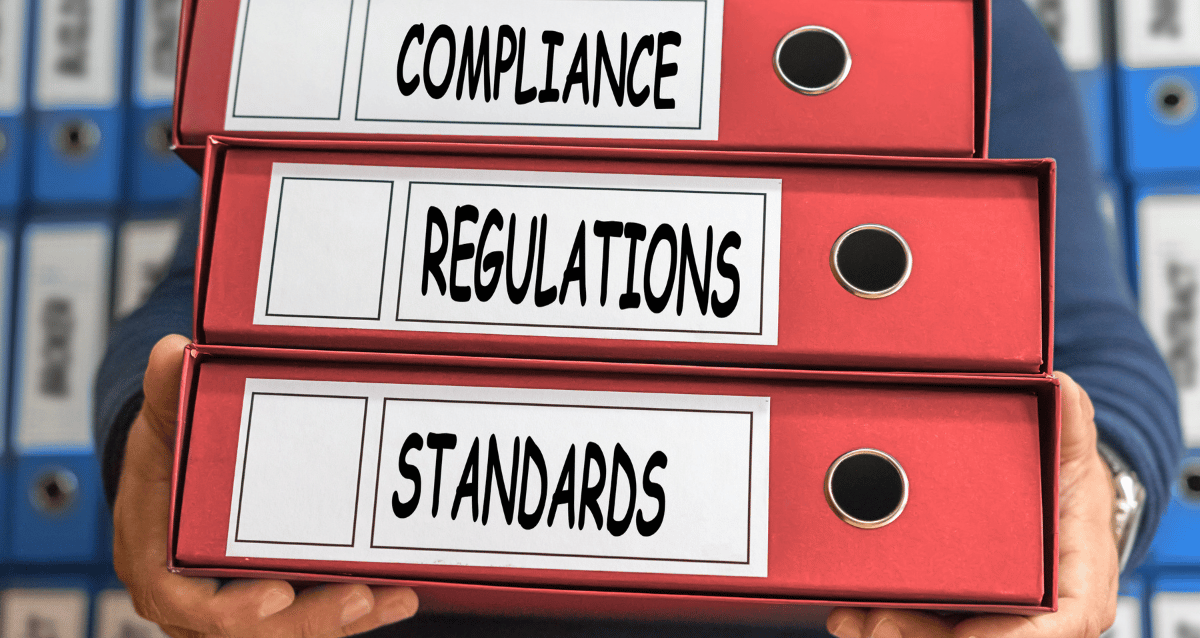
There’s no way around it, compliance with U.S. environmental and safety regulations is an absolute must.
Vehicles must meet EPA emission standards and DOT safety standards to be legally imported (3).

Do not forget to request certification labels from the manufacturer to confirm compliance with regulations (4). If missing, you may receive harsh fines or at the very least you’ll require modifications by a Registered Importer (RI) upon arrival.
Handle Customs Clearance
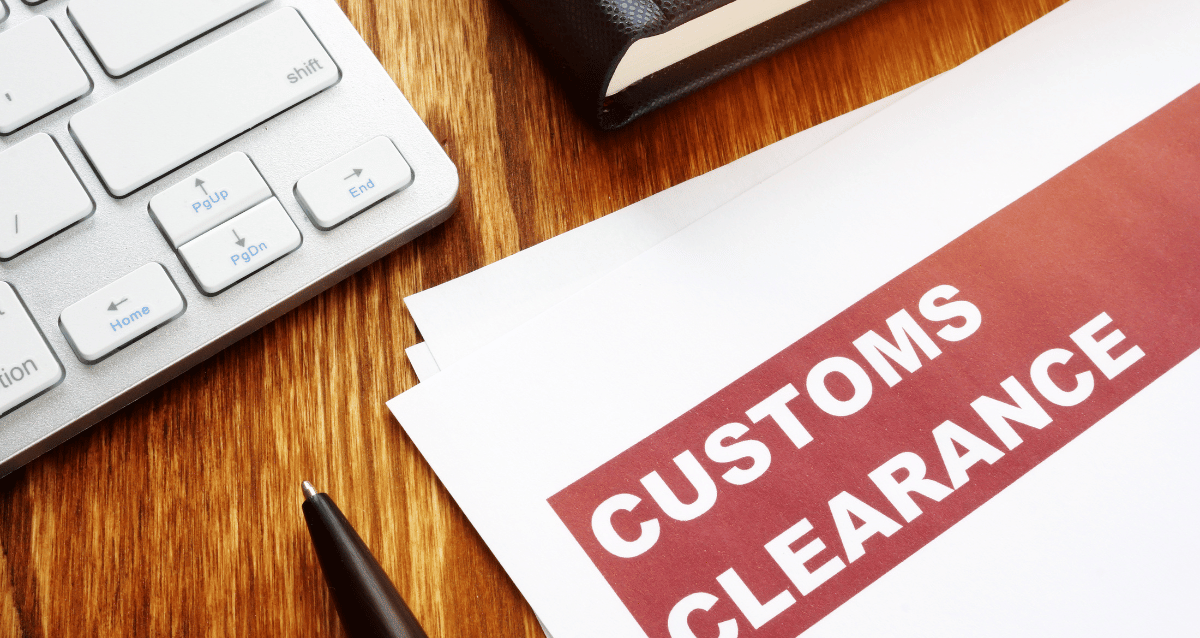
For a smooth customs clearance, have all important document organized and ready. Essential documents include:
- Vehicle title
- Bill of sale
- Foreign registration
- Compliance forms for both EPA and DOT regulations
After customs verification, an informal entry (Customs Form 368) must be submitted for vehicle registration.
Important note: Imported vehicles must not be used as storage for personal items during shipping. You risk fines or seizure otherwise.
Register Your Imported Vehicle

Once your vehicle has successfully passed through customs, the next step is registration.
Collect the proper documentation for vehicle registration and title transfer, including proof of ownership, proof of insurance, emission and safety inspection certificates, license plates/permits, and your ID.

Once you’ve organized all your documents, simply head to your local Department of Motor Vehicles (DMV) or equivalent agency to complete the registration process—it’s that easy!
Please Note: make sure to check your state’s specific requirements as they can differ significantly.
Avoid Common Pitfalls and Scams

No one wants to fall victim to scams or make costly mistakes, do your research and follow our tips for a seamless experience!
Do’s:
- Do Research the Seller: Check reviews and ratings to ensure they are reputable.
- Do Verify Vehicle History: Use services that provide vehicle history reports to check for accidents, ownership records, and title issues.
- Do Use Reputable Dealers: Purchase from established international dealers to reduce risks.
- Do Understand Payment Options: Clarify the payment process and consider secure methods that provide documentation.
- Do Get a Third-Party Inspection: Hire an independent inspector to assess the vehicle’s condition before buying.
- Do Ensure Compliance: Confirm that the vehicle meets U.S. safety and emissions standards to avoid legal issues.
- Do Keep Copies of All Documents: Maintain copies of all paperwork for your records.
Don’ts:
- Don’t Rush the Process: Avoid high-pressure sales tactics; take your time to research and make informed decisions.
- Don’t Skip Vehicle Inspections: Never purchase without a thorough inspection from a trusted source.
- Don’t Accept Unclear Payment Methods: Avoid sellers requesting cash or unconventional payment methods without a paper trail.
- Don’t Ignore Red Flags: If the seller is evasive about the vehicle’s history or refuses to provide documentation, consider it a warning sign.
- Don’t Overlook Import Regulations: Familiarize yourself with the legal requirements for importing vehicles to avoid costly complications later.
- Don’t Forget About Additional Costs: Be aware of import duties, taxes, and shipping fees that may affect your total budget.
By taking these precautions, you can save money and ensure a safe and successful car-buying experience overseas!
Insurance and Services for International Auto Shipping
When figuring out how to ship a car overseas, proper insurance coverage becomes essential. After helping hundreds of customers protect their vehicles during overseas transport, I know exactly what matters in these policies.
Protecting Your Investment During Transport
Many people asking “is it cheaper to buy a car overseas?” overlook the importance of comprehensive shipping insurance:
- Full-value coverage protects against damage during handling
- Marine insurance covers sea transport risks
- Port storage protection guards your vehicle at terminals
“One customer saved $12,000 when their BMW sustained damage during unloading because they had full coverage,” I tell people considering international shipping.
Understanding Your Insurance Options
When calculating how much it costs to ship a car overseas, factor in these insurance choices:
- Basic carrier liability (included but minimal)
- All-risk comprehensive coverage (recommended)
- Deductible options that affect premium costs
- Full replacement value vs. depreciated value
Understanding auto transport insurance helps protect your overseas purchase completely.
Value-Added Services Worth Considering
Beyond insurance, these additional services enhance your experience when you buy a car overseas:
- Door-to-door delivery from seller to your home
- Customs brokerage handling paperwork
- Temporary storage at destination ports
- Vehicle compliance modifications
Each service affects how much it costs to ship a car overseas but provides valuable convenience.
Expedited Shipping Options
For those in a hurry after they buy a car overseas:
- Priority loading at origin ports
- Direct sailing schedules (fewer port stops)
- Express customs clearance services
- Guaranteed delivery timeframes
These premium options cost more but dramatically reduce transit times.
Summary
Understanding How to Ship a Car Overseas
- Purchase verification and payment clearing
- Export preparation in the country of origin
- Ocean freight shipping (typically 2-4 weeks)
- US customs clearance and import duties
- Compliance modifications if needed
Cost Breakdown: How Much Does It Cost to Ship a Car Overseas?
- Ocean freight: $1,500-3,000 depending on origin
- Import duties: 2.5% for cars, 25% for trucks
- Customs processing fees: $300-500
- Compliance modifications: $0-5,000 depending on the vehicle
Is It Cheaper to Buy Motor Vehicles Overseas? Real Examples
- German performance cars often cost 20% less in Germany
- Classic Japanese sports cars can be half-price when you buy a car overseas
- Rare variants not sold in US markets come at competitive prices
- Vintage vehicles over 25 years old bypass expensive compliance requirements
Ready to explore if it’s cheaper to buy a car overseas for your dream vehicle? Get approved with ShipYourCarNow and let our experts help you understand exactly how to ship a car overseas. International vehicle shipping is made easy with ShipYourCarNow!

With the right preparation, shipping a car from another country can be an exciting journey. So, get ready to explore the international car market—you might discover your dream car!
Frequently Asked Questions
What are the main benefits of buying a car overseas and importing it?
Buying a car overseas can lead to significant cost savings, access to unique models not available locally, and often better resale values due to their rarity and demand. This makes it an attractive option for savvy car buyers.
What documentation is required for customs clearance when importing a vehicle?
To successfully clear customs when importing a vehicle, you will need essential documents such as the vehicle title, bill of sale, foreign registration, and compliance forms for EPA and DOT regulations, along with a bill of lading.
How can I ensure my vehicle complies with U.S. environmental and safety standards?
To ensure your vehicle complies with U.S. environmental and safety standards, confirm it has a certification label from the original manufacturer indicating compliance with Federal Motor Vehicle Safety Standards (FMVSS). If it lacks this label, modifications by a Registered Importer may be required.
What are the roles of Independent Commercial Importers (ICIs) in the vehicle import process?
Independent Commercial Importers (ICIs) are essential in the vehicle import process as they modify and certify nonconforming vehicles to meet U.S. emission and safety standards. Their expertise helps ensure compliance with regulations, safeguarding against legal complications.
What are some common pitfalls to avoid when buying a car from another country?
To avoid common pitfalls when buying a car from another country, ensure you research the seller’s reputation and verify the vehicle’s background. Additionally, clarify the payment process and consider using third-party inspection services to assess the car’s condition.

